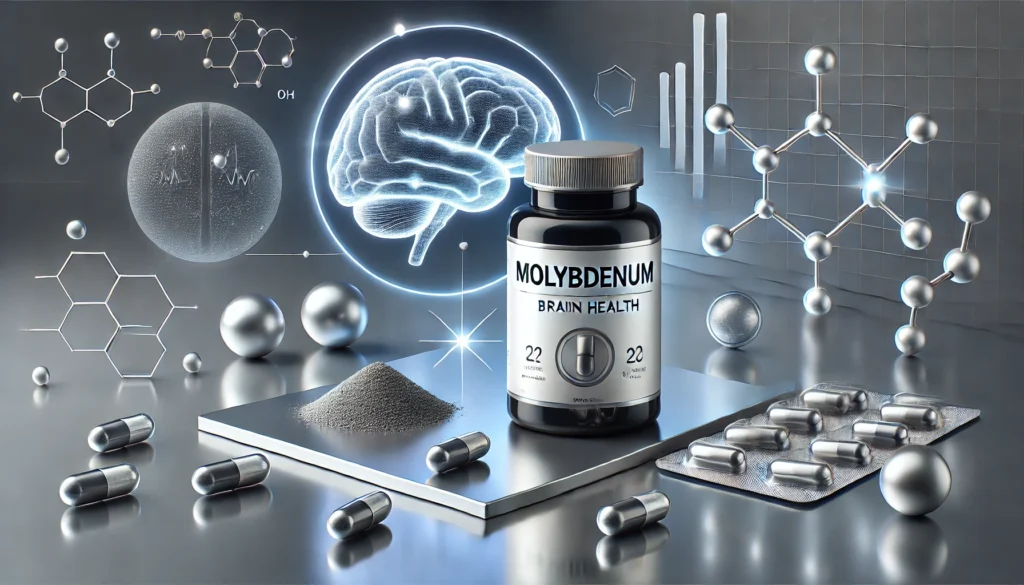Molybdenum is a trace mineral that plays a critical role in various physiological processes, including the metabolism of sulfur-containing amino acids, the detoxification of harmful substances, and the proper functioning of certain enzymes. Despite its essential role in human health, molybdenum is often overlooked in discussions about nutrition and supplements, particularly with regard to its potential as a nootropic agent.
This article aims to provide a comprehensive analysis of molybdenum, exploring its chemistry, physiological mechanisms, potential nootropic benefits, appropriate dosages, side effects, interactions with other supplements and medications, and considerations for safe supplementation. Given its essential role in supporting various metabolic processes, molybdenum’s potential to enhance cognitive function warrants further attention, particularly for those seeking to optimize brain health and performance.
You May Also Like:
Sources of Molybdenum
Molybdenum is a naturally occurring element in the Earth’s crust, and it can be found in a variety of foods, particularly plant-based sources. The amount of molybdenum present in food depends largely on the molybdenum content of the soil in which it is grown. The richest dietary sources of molybdenum include legumes, grains, nuts, and certain vegetables. Animal-based foods, including meat, poultry, and dairy, generally contain lower amounts of molybdenum.
Notable sources of molybdenum include:
- Legumes: Lentils, beans, peas, and chickpeas are excellent sources of molybdenum.
- Grains: Oats, barley, wheat, and rice are good plant-based sources.
- Vegetables: Spinach, cabbage, and potatoes contain moderate amounts of molybdenum.
- Nuts and seeds: Almonds, sunflower seeds, and sesame seeds also provide molybdenum.
- Animal-based foods: Liver and kidneys (especially from beef) are among the best sources of molybdenum from animal products, though they provide relatively smaller amounts compared to plant-based foods.
For individuals following a plant-based diet, molybdenum intake is typically sufficient from a balanced diet, though those with specific dietary restrictions may consider molybdenum supplements to ensure adequate intake.

Chemistry of Molybdenum
Molybdenum is a transition metal with the chemical symbol Mo and atomic number 42. In its natural form, molybdenum is typically found as part of various molybdenum-containing compounds, including molybdate salts (e.g., sodium molybdate and ammonium molybdate), which are the bioavailable forms of the mineral that the body can absorb and use.
Molybdenum is incorporated into several key enzymes that facilitate important biochemical reactions in the body. The mineral is primarily involved in electron transfer reactions, acting as a cofactor for enzymes such as xanthine oxidase, sulfite oxidase, and aldehyde oxidase. These enzymes are involved in processes ranging from purine metabolism (involved in the breakdown of nucleic acids) to the conversion of sulfite to sulfate in the liver. These processes are vital for detoxification, metabolic regulation, and maintaining cellular homeostasis.
The role of molybdenum in the function of these enzymes underscores its importance in various biochemical pathways that support not only general health but also specific functions in brain health and cognition.
Physiological Mechanisms of Molybdenum in the Body
Molybdenum’s physiological roles in the body are wide-ranging, and its effects can be understood through its involvement in key enzymatic functions. Below, we detail the major ways in which molybdenum impacts human physiology, particularly regarding brain function and metabolism.
- Enzymatic Cofactor in Detoxification and Metabolism: Molybdenum serves as a critical cofactor for enzymes involved in detoxification and the metabolism of sulfur-containing compounds. Specifically, sulfite oxidase, which requires molybdenum, catalyzes the conversion of sulfites (toxic byproducts from the breakdown of certain amino acids) to sulfate, which is then excreted from the body. This detoxification process is vital for maintaining a healthy liver and preventing the accumulation of harmful substances that could affect overall health and cognitive function.
- Purine Metabolism: Molybdenum is a necessary cofactor for xanthine oxidase, an enzyme that plays a key role in the breakdown of purines, which are components of DNA and RNA. By facilitating the breakdown of purines into uric acid, molybdenum helps regulate cellular functions and may also contribute to overall cellular energy metabolism. This process ensures the optimal functioning of brain cells and supports neural health.
- Antioxidant Activity: Molybdenum is involved in the production of uric acid, an important antioxidant that helps neutralize free radicals in the body. By mitigating oxidative stress, uric acid protects brain cells from oxidative damage, which has been implicated in neurodegenerative diseases and cognitive decline. Molybdenum’s antioxidant properties may, therefore, contribute to preserving cognitive function over time.
- Potential Role in Mitochondrial Function: The enzymes that depend on molybdenum are involved in several biochemical pathways that take place in the mitochondria, the energy-producing structures of the cell. Maintaining efficient mitochondrial function is crucial for brain health, as neurons are particularly sensitive to energy imbalances. The proper functioning of enzymes like aldehyde oxidase and xanthine oxidase supports mitochondrial health and optimal cellular energy production, which is essential for maintaining cognitive performance and overall mental clarity.

Potential Nootropic Benefits of Molybdenum
Although molybdenum is primarily known for its role in metabolism and detoxification, emerging research suggests that this trace element may have potential nootropic benefits, particularly related to cognitive function, memory, and brain health. The potential nootropic effects of molybdenum are largely a result of its role in antioxidant defense, detoxification, and enzyme regulation.
- Enhancement of Cognitive Performance: The ability of molybdenum to support cellular energy metabolism, reduce oxidative stress, and promote detoxification may contribute to cognitive performance. By maintaining brain health at the cellular level, molybdenum may improve memory, focus, and overall brain function. Additionally, by promoting mitochondrial health, molybdenum may enhance cognitive endurance and protect against cognitive fatigue.
- Neuroprotective Effects: Molybdenum’s antioxidant activity, particularly through its involvement in the production of uric acid, may help protect the brain from oxidative damage. Oxidative stress is a key contributor to neurodegenerative diseases like Alzheimer’s and Parkinson’s, as well as cognitive decline in aging. By reducing oxidative stress, molybdenum may act as a neuroprotective agent, potentially slowing the progression of age-related cognitive decline.
- Mood and Mental Clarity: The detoxifying effects of molybdenum may also play a role in improving mood and mental clarity. By reducing the accumulation of toxic metabolites and supporting the proper functioning of enzymes involved in purine and sulfur metabolism, molybdenum may help maintain a balanced mental state. This could translate into improved mood stability and mental clarity, which are crucial for optimal cognitive function.

Dosage of Molybdenum
The recommended dietary allowance (RDA) for molybdenum varies by age, gender, and life stage. For adults, the RDA for molybdenum is set at 45 micrograms per day, though most individuals obtain sufficient amounts through their diet, particularly if they consume a variety of legumes, grains, and vegetables.
For those considering molybdenum supplementation, typical supplemental dosages range from 50 to 500 micrograms per day. It is essential to consult a healthcare provider before beginning supplementation, especially at higher doses, to ensure that molybdenum intake remains within safe limits.
While deficiencies in molybdenum are rare, supplementation may be beneficial for individuals with impaired absorption due to gastrointestinal conditions, vegetarians, or those with limited access to molybdenum-rich foods. As with any supplement, it is essential to follow dosing guidelines and consult a healthcare provider for personalized advice.
Side Effects of Molybdenum
Molybdenum is generally considered safe when consumed in amounts within the recommended daily intake. However, excessive molybdenum intake (more than 2,000 micrograms per day) may lead to toxicity, which can result in symptoms such as:
- Joint pain or stiffness
- Gastrointestinal distress (e.g., nausea, vomiting, diarrhea)
- Skin rashes or other dermatological reactions
High molybdenum levels may also interfere with copper metabolism, leading to copper deficiency. As such, molybdenum supplementation should be approached with caution, particularly at high doses.

Interactions with Other Supplements and Medications
Molybdenum may interact with certain medications or supplements, particularly those that influence mineral absorption or affect copper metabolism. For example:
- Copper: High molybdenum intake can interfere with copper absorption, potentially leading to copper deficiency. Therefore, individuals taking copper supplements should monitor their molybdenum intake.
- Iron: Iron supplementation, especially in high doses, may also affect molybdenum absorption, as both minerals compete for absorption in the intestines.
Individuals taking medications or supplements that affect mineral metabolism should consult with a healthcare provider to avoid potential interactions.
Considerations for Individuals with Certain Health Conditions
Individuals with certain health conditions, such as renal disorders or gastrointestinal issues, may have altered molybdenum metabolism and should seek medical advice before starting supplementation. Those with kidney disease, for instance, may need to limit their molybdenum intake to avoid the accumulation of excess minerals in the body. Similarly, individuals with gastrointestinal disorders, such as Crohn’s disease or celiac disease, may have impaired nutrient absorption and might benefit from monitored supplementation to ensure adequate levels of molybdenum.
Conclusion
Molybdenum is a vital trace mineral with critical roles in detoxification, metabolism, and enzymatic function, offering potential cognitive and neuroprotective benefits. Its involvement in reducing oxidative stress, enhancing mitochondrial function, and promoting detoxification underscores its potential as a nootropic supplement for supporting brain health and cognitive performance. While most individuals obtain sufficient molybdenum through a balanced diet, supplementation may benefit those with dietary restrictions or specific health concerns.
As with any supplement, it is crucial to approach molybdenum supplementation with informed caution, adhering to recommended dosages and consulting healthcare professionals when necessary. By supporting metabolic processes and protecting against oxidative damage, molybdenum offers an intriguing avenue for enhancing cognitive well-being and overall brain health.

References:
- Clinical neuroimaging features and outcome in molybdenum cofactor deficiency. Retrieved from: https://pubmed.ncbi.nlm.nih.gov/21907887/
- Why Molybdenum Is an Essential Nutrient. Retrieved from: https://www.healthline.com/nutrition/molybdenum
- Biometals in Alzheimer disease: emerging therapeutic and diagnostic potential of molybdenum and iodine. Retrieved from: https://translational-medicine.biomedcentral.com/articles/10.1186/s12967-023-04220-5
- What to know about molybdenum. Retrieved from: https://www.medicalnewstoday.com/articles/molybdenum-uses
- Molybdenum – Uses, Side Effects, and More. Retrieved from: https://www.webmd.com/vitamins/ai/ingredientmono-1249/molybdenum
Important Note: The information contained in this article is for general informational purposes only, and should not be construed as health or medical advice, nor is it intended to diagnose, prevent, treat, or cure any disease or health condition. Before embarking on any diet, fitness regimen, or program of nutritional supplementation, it is advisable to consult your healthcare professional in order to determine its safety and probable efficacy in terms of your individual state of health.
Regarding Nutritional Supplements Or Other Non-Prescription Health Products: If any nutritional supplements or other non-prescription health products are mentioned in the foregoing article, any claims or statements made about them have not been evaluated by the U.S. Food and Drug Administration, and such nutritional supplements or other health products are not intended to diagnose, treat, cure, or prevent any disease.


